McAfee vs Webroot: Full Antivirus Feature Comparison (2025)
McAfee is among the best antiviruses available, while Webroot offers reliable basic security without compromising performance. So, I tested these antiviruses against each other to learn if Webroot can perform on par with one of the best security apps.
After thorough tests, I found that Webroot has many strengths, like its lightweight design and 70-day money-back guarantee. However, I also learned that McAfee outperforms Webroot in most categories, including malware detection, customer support, and more.
So, while Webroot is a good choice if you want a light antivirus for basic security on all platforms, McAfee is the superior security app. It has a 100% malware detection rate, a customizable firewall, a built-in VPN, and more. Plus, you can try McAfee risk-free with its 30-day money-back guarantee.
Try McAfee risk-free for 30-days
No Time? Here’s a 1-Minute Summary of Category Winners
McAfee performs better than Webroot in most cases. It detects more malware via scans, offers better real-time security, and includes a much larger variety of features. Webroot has its strengths, like its lightweight design and an impressive money-back guarantee, but McAfee is the better overall choice.
 |
 |
|
| Virus Scanner | Detects 100% of malware via its virus scans | Offers multiple virus scans but only detects 95% of malware |
| Real-Time Malware Protection | Blocks 100% of real-time threats and zero-day malware | Misses multiple real-time threats |
| System Performance | Causes minor slowdowns | Lightweight security app that doesn’t impact system performance |
| VPN | Has a built-in VPN with AES 256-bit encryption | Does not offer a VPN |
| Parental Controls | McAfee’s Safe Family parental controls provide various tools to protect children | Does not come with parental controls |
| Firewall | Has an intuitive firewall with many customization options | Has a firewall but it doesn’t include customization options |
| Password Manager | Comes with a reliable built-in password manager | Provides the LastPass password manager |
| Gaming Mode | Doesn’t offer a gaming mode | Has a specific plan for gamers, but it doesn’t provide any benefits |
| Optimization Tools | Has multiple tools that help improve overall performance | Includes a System Optimizer tool, but it only helps free up space |
| Other Features | Offers features like a network monitor, file shredder, app updater, and more | Includes a sandbox environment for testing unsafe apps and provides up to 25GB of cloud storage |
| Device Compatibility | Works on Windows, macOS, iOS, and Android | Secures Windows, macOS, iOS, and Android devices |
| Customer Service | 24/7 live chat, phone support, and an online knowledge base | Phone support, email support, and an online knowledge base |
| Price | Excellent value for money on all plans | Doesn’t offer the best value for its price |
| Free Trial | 30-day free trial that requires a credit card | 14-day-long free trial that doesn’t require a credit card |
| Money-Back Guarantee | 30-day money-back guarantee | 70-day money-back guarantee |
Protect your devices with McAfee
How I Tested and Compared McAfee vs Webroot
- Virus Scanner — I tested the virus scanners in both antiviruses to see which app detects more malware.
- Real-Time Malware Protection — I analyzed how effectively each app blocks real-time threats and zero-day malware.
- System Performance — I tested both apps’ impact on overall performance and checked if they cause slowdowns.
- VPN — I checked if these antiviruses have VPNs and whether their VPNs offer security and anonymity online.
- Parental Controls — I looked at whether these antiviruses provide parental controls and how effectively they safeguard children.
- Firewall — I analyzed both apps’ firewalls to see which one offers more security and customization options.
- Password Manager — I compared the password managers in both antiviruses to check which one offers better protection for sensitive credentials.
- Gaming Mode — I checked if these apps offer gaming modes and if these modes benefit gaming performance in any way.
- Optimization Tools — I looked at whether either antivirus offers optimization tools and if these tools improve system performance.
- Other Features — I looked at which app offers more security features.
- Device Compatibility — I checked which antivirus protects more platforms.
- Customer Service — I contacted each app’s customer support through all available channels to see which one offers more help when needed.
- Price — I compared price plans to learn antivirus offers more value for money.
- Free Trial — I looked at which app offers a better free trial option.
- Money-Back Guarantee — I checked if these antiviruses offer money-back guarantees so people can try them risk-free.
Secure your system with McAfee
1. Virus Scanner — McAfee Detects All Malware via Its Scans
I started by testing each app’s various virus scanners to see how effectively they can find and remove malware from your system. I learned that McAfee’s scans are better at detecting and eliminating viruses because they found 100% of the malware on my device. Webroot also has a decent 95% malware detection score, but it isn’t nearly as good as McAfee.
You’ll get the following virus scans with these security apps:
| McAfee | Webroot |
| Quick Scan | Quick Scan |
| Full Scan | Full Scan |
| Custom Scan | Deep Scan |
| – | Custom Scan |
One difference between both apps’ scan options is that Webroot also offers a Deep Scan. The app says that the Deep Scan finds rootkits, Trojans, and other malware that other scans can’t detect. However, McAfee is still the superior choice because it doesn’t need this extra scan. Instead, McAfee discovers all threats via its Full Scan, including deeply hidden ones.
One thing worth noting is that Webroot’s scans are faster than McAfee’s. Its Quick Scan takes under a minute, while McAfee’s Quick Scan can take up to 5 minutes. However, this isn’t much of an advantage considering that Webroot’s scans failed to detect several malicious test files I planted on my computer.
Overall, McAfee wins in this category as its scans are a lot more effective, even though they’re a bit slower than Webroot’s scans.
Virus Scanner Winner: McAfee
2. Real-Time Malware Protection — McAfee’s Real-Time Security Blocks All Zero-Day Malware
While both these apps offer effective tools for real-time security, I found that McAfee is better at blocking malware before it infects your system.
Based on self-testing and data from AV-TEST, an independent organization that evaluates antivirus performance, McAfee has a 100% malware detection rate against real-time threats. Plus, it offers effective web protection, ransomware protection, phishing protection, and more to secure your system. In my tests, McAfee blocked all malware samples I attempted to download. However, I want to highlight that it also flagged a few safe files as malicious, meaning its protection isn’t flawless.
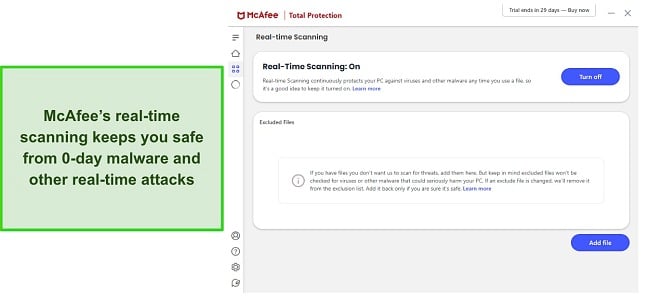
Webroot also has an impressive variety of tools to secure your system against real-time threats. It includes a web shield, rootkit shield, script shield, and other features you can toggle on and off with a click. Unfortunately, Webroot’s real-time security wasn’t as good as McAfee’s during my tests, as it failed to block multiple cyber threats from infecting my system.
Independent testing carried out by SE Labs, another reputable independent organization that carefully evaluates security products, corroborated my findings and gave Webroot an accuracy of 86%.
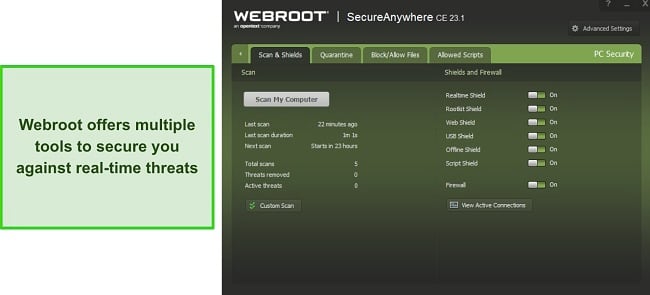
McAfee’s 100% detection rate against real-time threats makes it the winner here.
Real-Time Malware Protection Winner: McAfee
3. System Performance — Webroot Consumes Fewer System Resources
In my tests, I found that Webroot is a lightweight antivirus and takes fewer system resources compared to McAfee. To determine the lighter antivirus, I did tasks like opening sites and copying files while they idled in the background with only real-time protection active.
The following table highlights the slowdowns you can expect when using these apps:
| McAfee | Webroot | |
| Slowdown when opening websites | 26% | 12% |
| Slowdown when copying files locally | 2% | 7% |
| Slowdown when launching applications | 22% | 9% |
McAfee has a bigger impact on performance than Webroot, especially when opening websites and launching apps.
Besides this, I looked at the resources these apps consume while idle and during full scans. I got the following results:
| Idle CPU Usage (Average) |
Idle Memory Usage (Average) |
Idle Disk Usage (Average) |
Full Scan CPU Usage (Max) | Full Scan Memory Usage (Max) |
Full Scan Disk Usage (Max) |
|
| McAfee | 2% | 160MB | 1MB/s | 39% | 383MB | 124MB/s |
| Webroot | 3% | 68MB | 2MB/s | 24% | 262MB | 86MB/s |
While both apps have similar resource consumption while idle, McAfee uses more resources during scans. So, Webroot wins in this category.
System Performance Winner: Webroot
Protect your system with Webroot
4. VPN — McAfee Offers a VPN to Keep You Safe and Anonymous Online
Of both choices, only McAfee offers a built-in VPN. It has an effective VPN that uses industry-standard AES 256-bit encryption and doesn’t keep logs of your activity, thus keeping you completely anonymous.
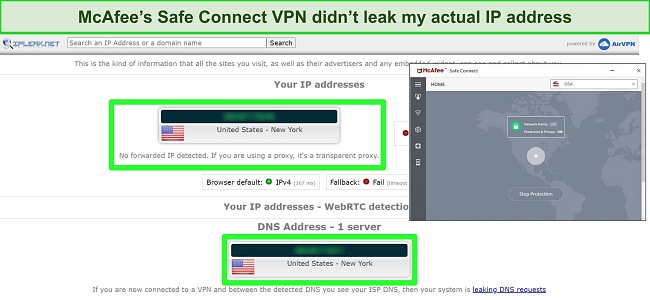
During tests, I was very pleased with McAfee’s VPN. It offers servers across 40+ countries, and each server performs very well. Even on the long-distance US server, I only experienced a 15% drop in connection speeds compared to my baseline values. So, connection speeds while connected to McAfee’s VPN remained fast enough for lag-free UHD streaming and smooth browsing.
Since McAfee’s VPN performs so well and Webroot doesn’t even have one, McAfee wins here.
VPN Winner: McAfee
Surf the web safely with McAfee
5. Parental Controls — You Can Easily Safeguard and Monitor Your Children Using McAfee
Webroot doesn’t include parental controls. On the other hand, McAfee has a feature-rich parental control suite called Safe Family that makes it easy to keep your kids safe. It has an array of tools you can use to track and manage your kids’ online activity.
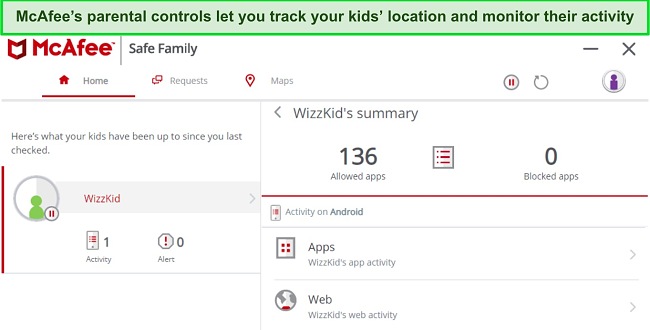
You can set up McAfee Safe Family by manually downloading the app onto your children’s devices. Once set up, you can use the controls to block malicious apps or websites, limit screen time, view browser history, and even track your kids’ location.
Among the best features of McAfee’s parental controls is that they offer location-based notifications. So, they’ll immediately notify you if your child leaves or enters a designated area.
Despite Webroot not even competing in this category, McAfee’s excellent parental controls make it the clear winner of this round.
Parental Controls Winner: McAfee
Safeguard your children with McAfee
6. Firewall — McAfee’s Firewall Is More Intuitive and Offers Several Customization Options
Although you’ll get a firewall with both security apps, McAfee’s firewall stands out as it is far more customizable. It has an intuitive interface and a variety of toggles that let you adjust the settings to your preferences. Plus, it offers a Traffic Controller feature to manage which apps have internet access and a Net Guard feature to monitor and control connections.
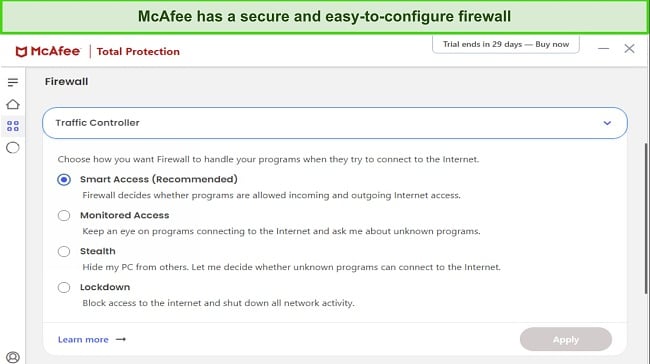
Besides the customization, McAfee’s firewall includes a Net Guard feature that lets you choose what connections to allow, thus securing you against risky ones. On the other hand, Webroot’s firewall offers decent baseline security, but I was disappointed to learn that you can’t customize it in any way.
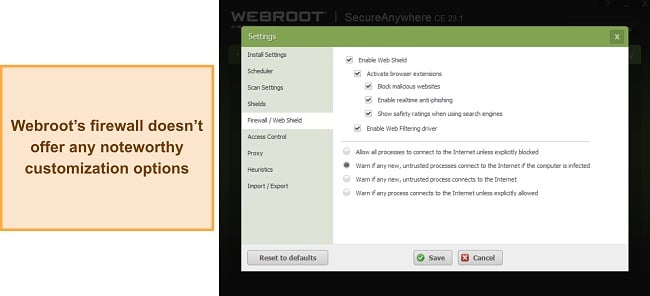
All things considered, McAfee’s firewall wins here as it’s more secure and customizable.
Firewall Winner: McAfee
Protect your computer with McAfee
7. Password Manager — Both Apps Offer Reliable Password Managers
You’ll get a great password manager with both antiviruses, and you can’t go wrong with either one. McAfee’s True Key password manager offers storage for passwords, credit cards, and other sensitive information. I especially like how easy it is to use and how neatly organized the menus are.
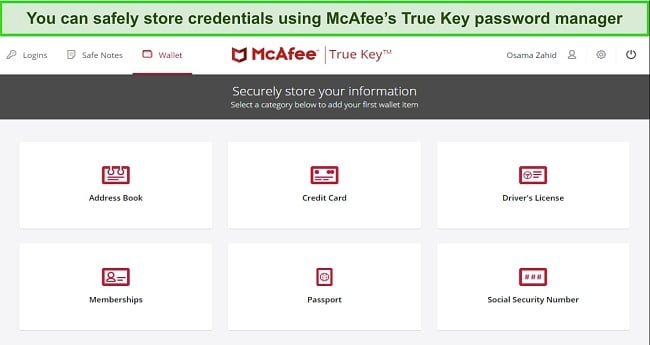
Webroot’s password manager is powered by LastPass, meaning you can expect top-grade performance as LastPass is among the renowned names in this space. It also has an intuitive design, and you can organize all your passwords by category, thus making them easier to find.
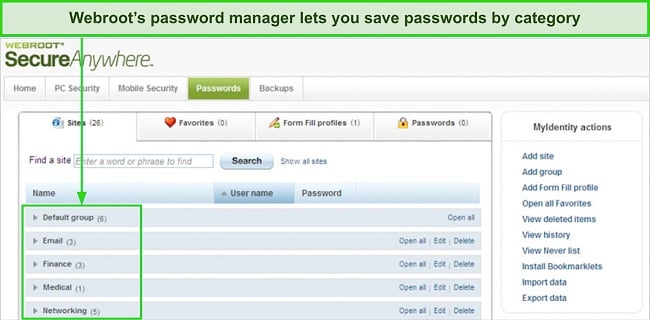
Both apps’ password managers include key security features like multi-factor authentication and AES 256-bit encryption, so your passwords will always remain secure.
Overall, it’s a tie here since both these apps offer effective password managers with airtight security for your credentials.
Password Manager Winner: Tie
8. Gaming Mode — Neither Antivirus Has an Effective Gaming Mode
You won’t get an effective gaming mode with either antivirus. While Webroot has a gaming-focused plan called Webroot AntiVirus for Gamers, it doesn’t provide any real benefits or new features.
On the other hand, McAfee doesn’t offer a gaming mode or any gaming-focused plans at all.
So, since neither of these antiviruses comes with an effective gaming mode, it’s a tie in this category.
Gaming Mode Winner: Tie
9. Optimization Tools — McAfee’s Optimization Tools Provide Noticeable Performance Boosts
Although both apps offer their share of optimization tools, I found McAfee’s tools a lot more effective. McAfee includes App Boost and Web Boost features for optimization, which work by speeding up app launches and making websites load faster.
Webroot’s only optimization tool is its System Optimizer, which doesn’t really improve performance. It finds junk files to delete and clears space on your system, which is always a good thing, but that’s all it does.
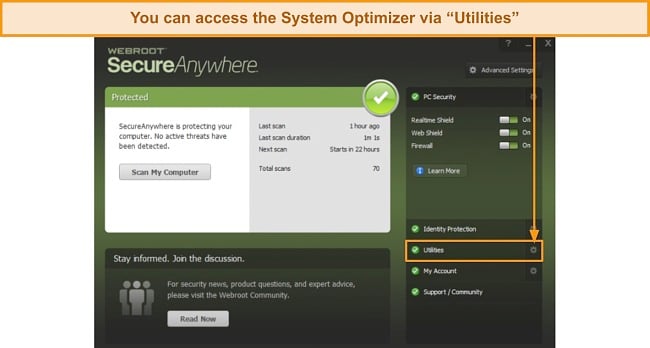
Since Webroot’s only optimization tool is a junk remover, McAfee wins with its App and Web Boost features.
Optimization Tools Winner: McAfee
Optimize system performance with McAfee
10. Other Features — You’ll Get a Wider Variety of Features With McAfee
Each of these antiviruses has its share of extra features for additional protection. However, McAfee offers more tools to secure you against cyber threats.
McAfee’s extra features include the following:
- File Shredder — lets you safely delete files so they’re no longer accessible.
- ID Theft Protection — checks if your passwords or other information was leaked in data breaches.
- Tracker Remover — removes trackers, cookies, and other files that cloud track your online activity and build a profile on you.
- Secure Apps — removes vulnerabilities by ensuring you have updated versions of your apps and OS.
I like that the File Shredder offers multiple shredding options, thus letting you choose exactly how many times you want to shred a file. I advise choosing the Safe or Complete options for sensitive files you don’t want anyone else to access.
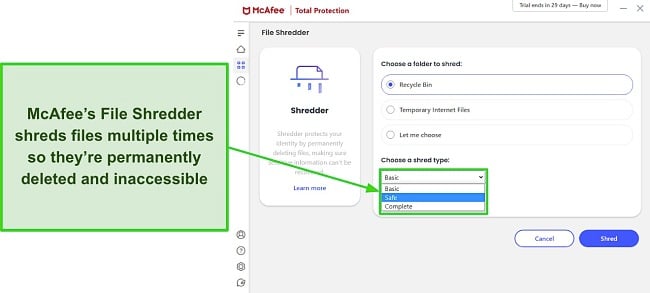
As for Webroot, it has the following additional features:
- SafeStart Sandbox — provides a secure environment where you can test files that may be malicious.
- Cloud Storage — offers up to 25GB of cloud storage for sensitive files and data.
- ID Monitoring — secures your identity and monitors the dark web to check for leaked credentials.
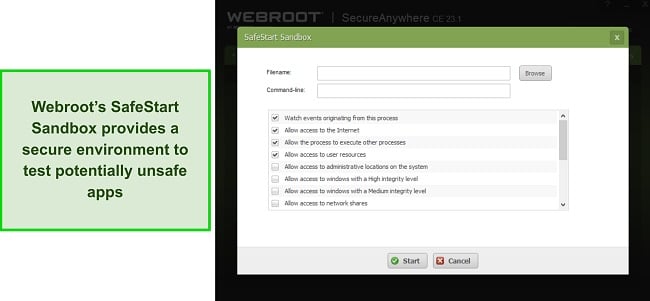
While both apps offer multiple extra tools for protection, McAfee wins here as it offers a larger feature variety.
Other Features Winner: McAfee
Safeguard your system with McAfee
11. Device Compatibility — You Can Use Both Security Apps on All Major Platforms
I was pleased to learn you can use McAfee and Webroot on all major platforms. Both options offer security apps for Windows, macOS, iOS/iPadOS, and Android, meaning you can use them to protect all your devices.
In my tests, I found all of McAfee’s apps easy to install and use. It only takes a few minutes to set them up on any platform, and they have intuitive interfaces for easy access to all features. Webroot’s apps are also easy to set up. Whether it’s on desktop or mobile platforms, you can easily install Webroot and use its features.
Since both antiviruses offer intuitive apps for all major platforms, it’s a tie here.
Device Compatibility Winner: Tie
12. Customer Service — McAfee’s Customer Support Has More Options and Feels More Responsive
Although both antiviruses have multiple customer support channels, McAfee has more options and feels more responsive.
Although McAfee’s support isn’t as fast as top choices like Norton, it’s fairly responsive and will provide the help you need to resolve most issues. I frequently contacted its live chat support and connected to an agent within a few minutes. The agents are knowledgeable, helpful, and always ready to assist in any way they can. McAfee also offers phone support and community forums for additional help.

Webroot’s customer service includes phone support, email support, and an online knowledge base. The obvious downside is that it doesn’t offer live chat, which many people prefer. Also, its phone support is only available in the US, UK, Australia, and Ireland. Thankfully, Webroot’s email support is helpful, and I got a detailed answer to my question when I contacted it.

Since McAfee provides 24/7 live chat besides its other support channels, it beats Webroot in this category.
Customer Service Winner: McAfee
13. Price — You’ll Get Better Value for Money With McAfee’s Plans
Both antiviruses have multiple well-priced plans, but I found that McAfee offers more value for money. Starting at just /year, it has the following plans:
- Total Protection Plus — provides McAfee’s core antivirus, firewall, web protection, password manager, ID monitoring, file shredder, and VPN for up to 5 devices.
- McAfee+ Premium — provides everything in Total Protection Plus, access to McAfee’s Personal Data Cleanup scans, and protects up to 10 devices.
- McAfee+ Advanced — includes McAfee+ Premium’s features, has McAfee’s full-service Personal Data Cleanup, lost wallet protection, $1M ID theft coverage, and monthly credit reports.
- McAfee+ Ultimate — offers McAfee’s credit lock, daily credit reports, and $25K ransomware coverage besides everything in McAfee+ Advanced.
While you’ll get great value with any of its plans, I suggest getting McAfee Total Protection Plus because it includes every important security feature and protects up to 5 devices. On the other hand, you’ll get the following plans with Webroot:
- SecureAnywhere Antivirus — protects 1 device with Webroot’s core antivirus and firewall (Windows only).
- Internet Security Plus — secures up to 3 devices (all platforms) with Webroot’s antivirus, firewall, and web protection.
- Internet Security Complete — includes Webroot’s optimization tools and all the features in Internet Security Plus. Also, it protects up to 5 devices.
- Webroot Premium — provides all the above features and includes Webroot’s ID theft protection.
I found Webroot Internet Security Plus the best value plan of all available options. You can protect more devices with Internet Security Complete and Webroot Premium, but the extra price isn’t worth it for the features you get.
All things considered, McAfee wins here as its plans offer much more value for money.
Price Winner: McAfee
Secure your devices with McAfee
14. Free Trial — McAfee’s Free Trial Is Twice as Long as Webroot’s
Both McAfee and Webroot offer a free trial, but McAfee’s free trial is much longer. McAfee gives you a 30-day-long free trial to try the app’s premium features completely risk-free. On the other hand, Webroot’s free trial is only 14 days long, meaning you won’t have a lot of time to try all its features.
Besides the length, another difference between both apps’ trials is that McAfee requires you to sign up with a credit card for its trial, while Webroot doesn’t. To try Webroot, just sign up with your email, download the antivirus, and start using it.
So, while you can use Webroot’s trial without a credit card, I consider McAfee the winner because its free trial is over twice as long.
Free Version Winner: McAfee
Protect your system with McAfee
15. Money-Back Guarantee — Webroot Offers a Much Longer Money-Back Guarantee
Both antiviruses offer money-back guarantees, but Webroot’s 70-day money-back guarantee is much longer. This is the longest money-back guarantee I’ve seen an antivirus offer, meaning you’ll have plenty of time to try Webroot’s features completely risk-free.
Of course, McAfee also offers an impressive 30-day-long money-back guarantee, which should give you plenty of time to try its features.
I also like that it’s easy to refund both antiviruses. I refunded McAfee via phone call and had my money back within 7 business days. On the other hand, you can refund Webroot by filling out the refund request form on its website. I had my money back within 36 hours of refunding Webroot, which was much quicker than I expected.
While both antiviruses offer money-back guarantees, Webroot wins here because of its longer guarantee and faster refunds.
Money-Back Guarantee Winner: Webroot
Try Webroot risk-free for 70 days
And the Winner Is… McAfee
After thorough testing, I found McAfee to be the superior overall antivirus. McAfee wins in 10 categories, Webroot wins in 2, and both apps are tied in 3 categories.
- Virus Scanner — McAfee
- Real-Time Malware Protection —McAfee
- System Performance — Webroot
- VPN — McAfee
- Parental Controls — McAfee
- Firewall — McAfee
- Password Manager — Tie
- Gaming Mode — Tie
- Optimization Tools — McAfee
- Other Features — McAfee
- Device Compatibility — Tie
- Customer Service — McAfee
- Price — McAfee
- Free Trial — McAfee
- Money-Back Guarantee — Webroot
Webroot is a decent antivirus with multiple highlights. For instance, it’s a great choice if you want to protect devices on all platforms with a lightweight antivirus that doesn’t slow down performance. Plus, its 70-day-long money-back guarantee gives you lots of time to try Webroot risk-free.
However, McAfee is better for comprehensive security against all cyber threats. It offers 100% malware detection via scans and against real-time threats, features like a built-in VPN and customizable firewall, and better customer support. Best of all, you can try McAfee risk-free as it’s backed by a 30-day money-back guarantee.
Overall Winner: McAfee
Secure your system with McAfee
How To Use McAfee’s Free Trial on Windows
The following steps let you install McAfee on Windows and use its trial to test all the app’s premium features. I’m using McAfee’s Windows antivirus as it’s the most popular choice for this app’s users. Of course, you can also install it on macOS, iOS, and Android.
- Choose the free trial on McAfee’s website — Open McAfee’s website and click on the 30-day free trial button.
![Screenshot showing the 30-day free trial option on McAfee's website]()
- Enter your details to start the trial — Enter your email address and payment details to start the trial. Your card won’t be charged until the trial expires.
![Screenshot showing the sign-up page for McAfee's 30-day free trial]()
- Download McAfee’s setup — You’ll be taken to the download page after subscribing. Click on Download to get McAfee’s setup.
![Screenshot showing the download button after subscribing to McAfee's free trial]()
- Install McAfee — Run McAfee’s setup, click on Install, and follow the steps to install the security app on your system.
![Screenshot showing the first step of McAfee's setup]()
- Use McAfee to secure your system — After installing McAfee, you can use its virus scans, firewall, VPN, and various other features to safeguard your system.
![Screenshot of McAfee after it's installed on Windows]()
Try McAfee risk-free for 30-days
FAQs About McAfee vs Webroot
Is McAfee better than Webroot?
Yes, McAfee is better than Webroot. It offers higher malware detection via scans, better real-time security, a customizable firewall, and a better variety of features. Plus, McAfee’s customer support has a 24/7 live chat option, while Webroot’s support doesn’t.
There are also other top antiviruses that provide airtight security. These offer excellent malware detection, advanced security features, and more to safeguard against cyber threats.
Can McAfee remove viruses effectively?
Can I trust Webroot?
Yes, Webroot is a trustworthy antivirus with various strengths and a long history of securing devices against cyber threats with a lightweight malware detection engine. However, it’s not the best overall option for airtight protection. It doesn’t have a perfect malware detection rate and is missing advanced security features like a customizable firewall.
For comprehensive security, I suggest you get a top antivirus like Norton. Norton offers industry-leading 100% malware detection, a built-in VPN, and other advanced features, which we’ve discussed in our in-depth Norton review.
How does McAfee and Webroot protection compare?
Can I get a free antivirus instead?
While there are a few good free antiviruses you can get, I advise choosing a premium security app if you want comprehensive security.


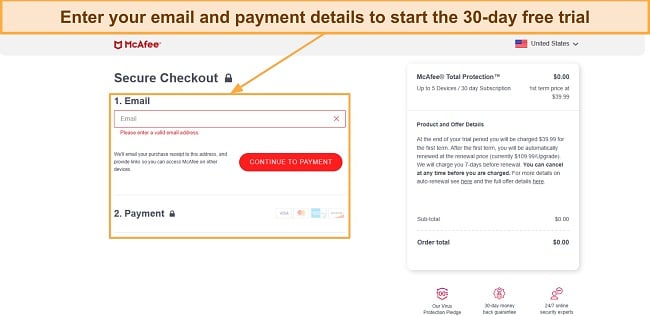
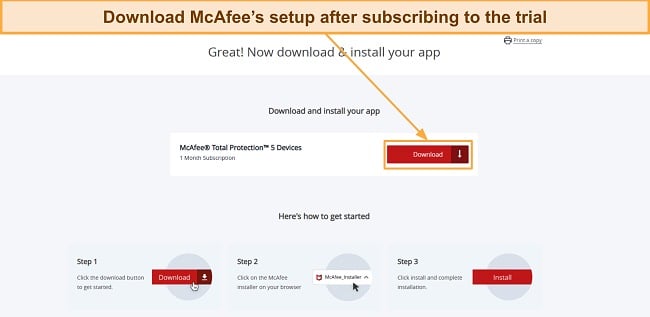
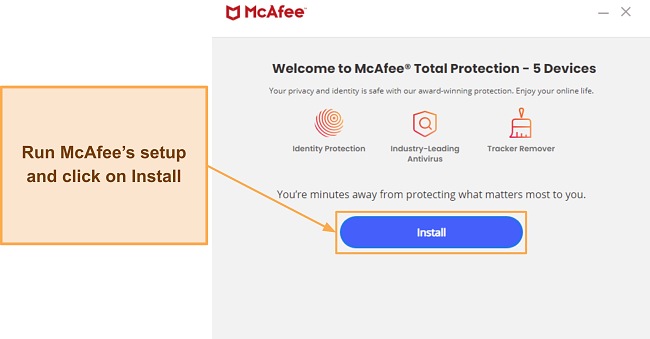
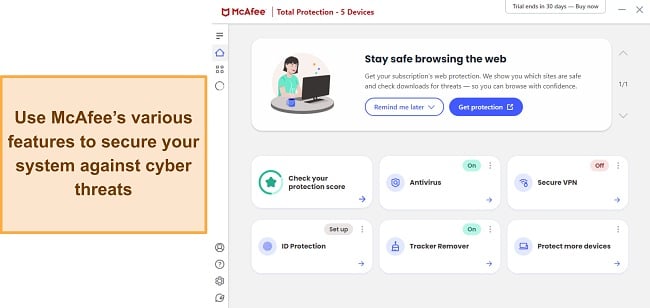




Leave a Comment
Cancel